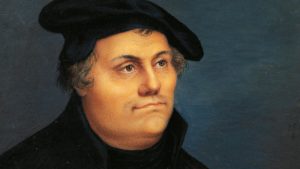Martin Luther’s Greatest Contribution
Christians around the world are celebrating the 500th anniversary of the Reformation. Not just Protestants, even many Roman Catholic and Eastern Orthodox Christians are celebrating!
Five hundred years ago, Martin Luther nailed 95 theses on Castle church door in Wittenberg, Germany. Most Christians today who read the document Luther posted would find his theses bewildering. But this event and many others before and after brought great change to the world.
Luther’s Theology
As Christians celebrate the anniversary of the Protestant Reformation on October 29, many will correctly praise Luther for his courage.
Theologians like me who study the details of Luther’s theology often have mixed feelings about his ideas. Some of what Luther said is applicable today; other things are not. Some aspects of Luther’s theology should be left in dustbins of history.
Luther was an enigmatic figure with an odd personality. He was prone to hyperbole (all those “solas,” for example) and just plain weirdness. Few today would lift him up as a moral example. But Luther is rightly praised for his courage and conviction.
Reforming
Luther’s greatest legacy and the greatest legacy of the Protestant Reformation is less about the specific theology he proposed. It’s more about the general need for changes in theology.
The Reformation reminds us that Christianity is not a static religion. It moves, adjusts, and transforms. Times change, people change, and the gospel of Christianity changes too, at least to some extent.
Some things in Christianity seem constant. Jesus is always central, although how we understand him varies over time. Love is central too, although what love demands seems to change. We could add other seemingly timeless aspects of the Christian faith.
Debates about the essentials and nonessentials in Christian faith will continue. The consensus varies from generation to generation.
Jesus may be the same yesterday, today, and forever, but the Christian faith is always in process. The Spirit is always doing a new thing!
Time for a New Reformation
It’s time again for something new. Every 500 years or so, something major seems to occur in Christian history. We’re due.
It’s time to ask ourselves, What will Christianity look like tomorrow? Who will Jesus be interpreted to be? What does love require in the present age? How should we now live?
Answering these questions is our present task. But we’re not the first. Change agents, revolutionaries, and theological entrepreneurs like Martin Luther have come before.
So let’s celebrate the 500th anniversary of the Reformation by raising a glass to Martin Luther!
(PS> When you’re celebrating Luther’s birthday on November 10, light a candle for me: I was born on that same date 482 years later!)

Comments
Tom: Wouldn’t it be great if, instead of more schisms and new denominations, we had a reformation that united various streams of Christianity? Each denomination has its theological distinctive that they have guarded dearly, whether second-blessing holiness, charismatic gifts, emphasis on end times, the sovereignty of God, pacifism, growth in sanctification, etc. Each is probably important and has been kept alive by parts of the church on behalf of all. Some people say the denominations are losing their distinctives. Some might see that as dumbing down and compromising. But maybe it’s a sign of God doing “a new thing.” It would be messy, as reformations are. But how wonderful to see Jesus prayer for unity answered, Christians laying aside their pet doctrines and coming together around the essentials of the faith. And then when we get down to the essence of those essentials, will the focus be “God is love”? And the essence of that love is uncontrolling, self-giving, and others empowering?
p.s. Nov. 10 is also my husband’s birthday. When I light a candle for him (on a cake?) we’ll at least in spirit, light one for Luther and one for you and pray that God will lead us into faithful and true answers to your questions:
“What will Christianity look like tomorrow? Who will Jesus be interpreted to be? What does love require in the present age? How should we now live?”
I like the way you think, Cathy! And I’m happy to hear that I share a birthdate with your husband too!